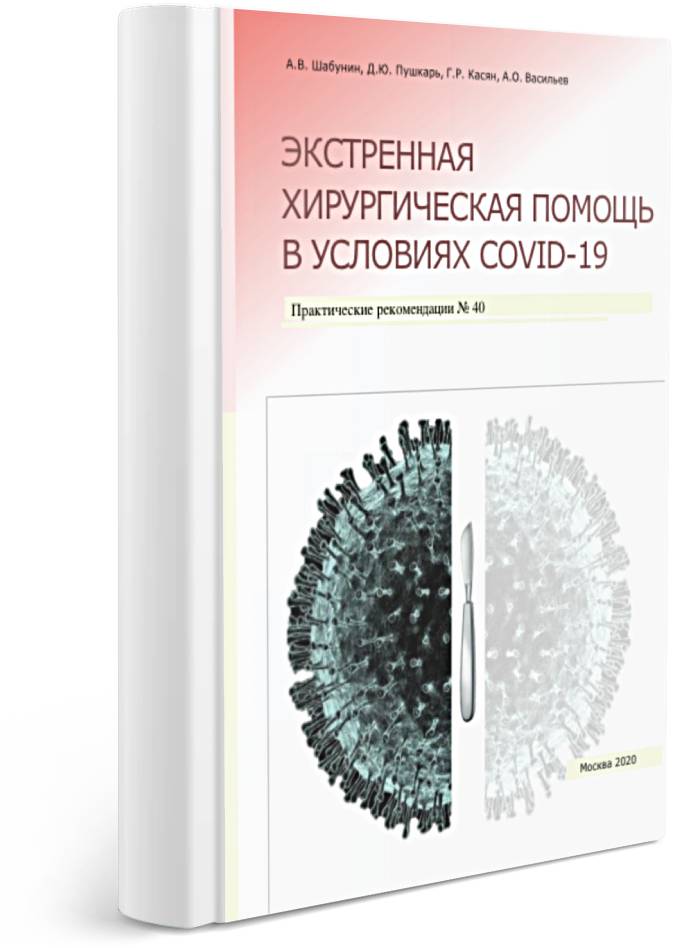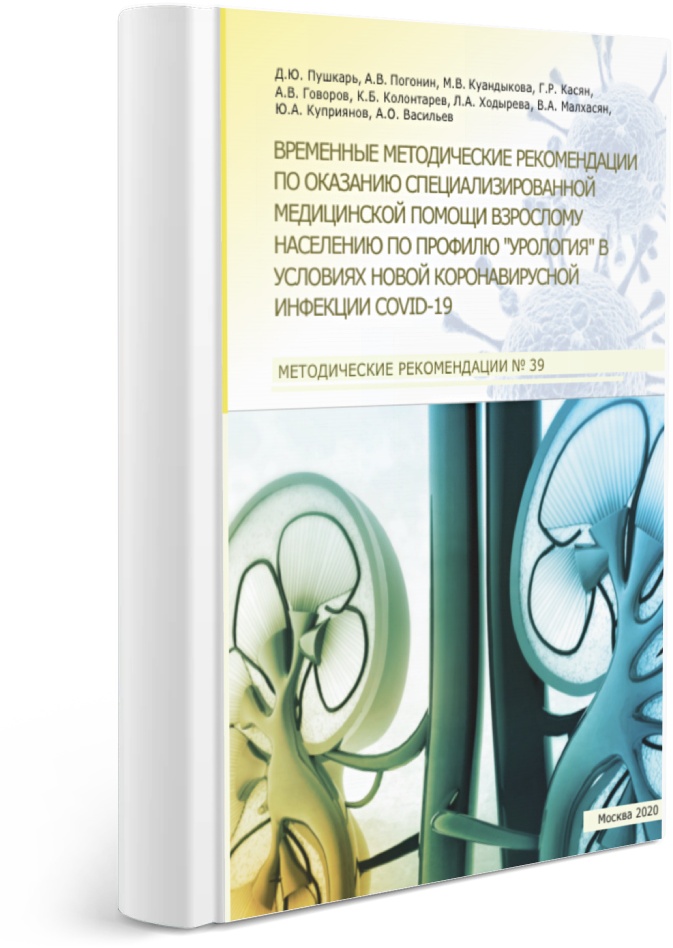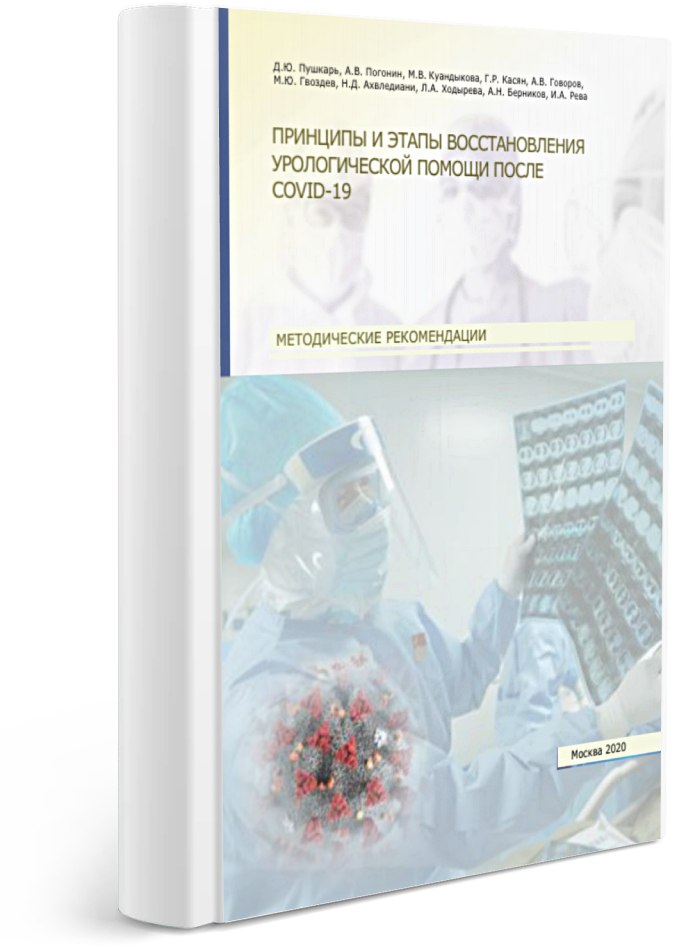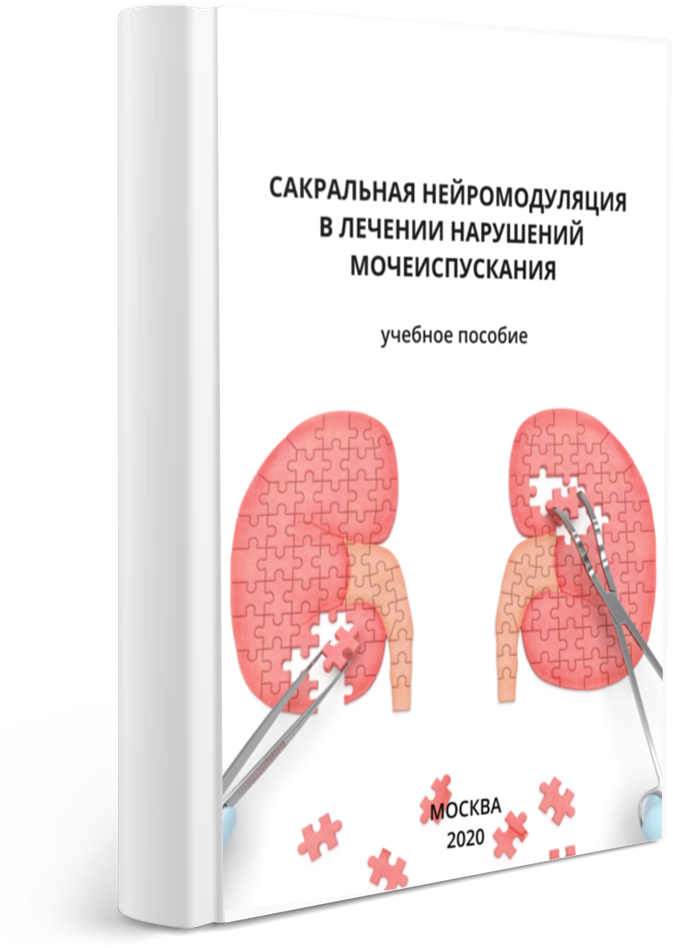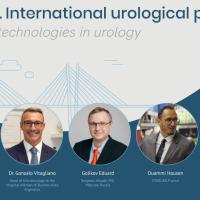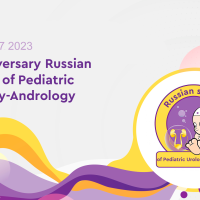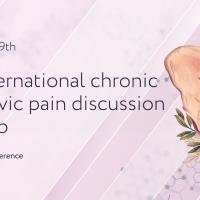Russian urology 2020: it is necessary to live here and now

Looking back in unusual 2020, it is necessary to recognize that it brought not only losses, but acquisitions as well. For sure that year will be remembered for a long time and will remain a subject of discussions, analysis, memoirs.
Blitzkrieg didn't happen
The COVID-19 pandemic, that has unexpectedly burst in the world, turned both urologists` and patients’ lives around. Moreover, if during the first wave in the period of March-June we hoped on a difficult but fast medicine and health system victory – «blitzkrieg» – in September we understood that it would take months or years to fight against a new infection. Dissidents declined as soon as the infection concerned their relatives or them personally.
During the first wave of COVID-19 the mass reshaping of urology departments in the infectious ones caused not only a decrease in the medical care quality for urological patients, but also – loss of its rendering. All forces were directed to the aid of COVID-19 patients whereas the urological ones with chronic diseases were left alone. However, many urologists remained in touch with their patients and helped them with recommendations as much as possible. But high load, work in «red zones», lack of time, forces and health, the compelled isolation of colleagues 65+, strongly limited the help to our patients.
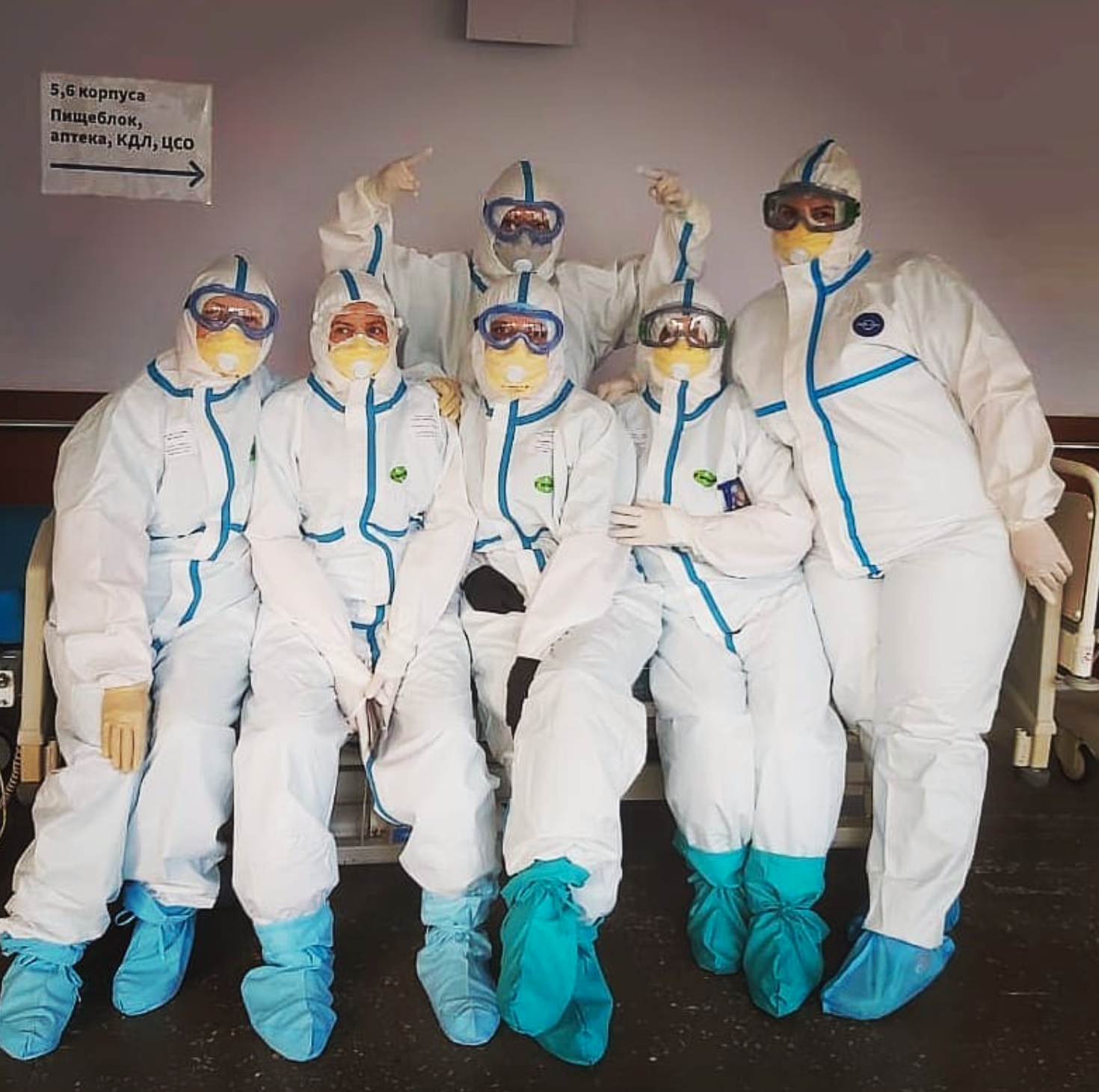
Employees of the 4th Urological Department of the City Clinical Hospital № 50 (Moscow)
By the time the second wave of COVID-19 developed, forces were mobilized, structured and better organized. Anti-epidemic measures unloved by everyone – masks, transition to teleworking, isolation of various groups of the population – apparently, nevertheless, fulfilled their purpose. At least people started taking things more seriously and took care of themselves. The reopened urological departments resumed acceptance of profile patients, having shown that the system consulted. At the very end of the outgoing year, it became known that some urological departments in Moscow were reorientated again, but now to provide urological care to the COVID-19 patients, so patients with urological diseases would get help in full.
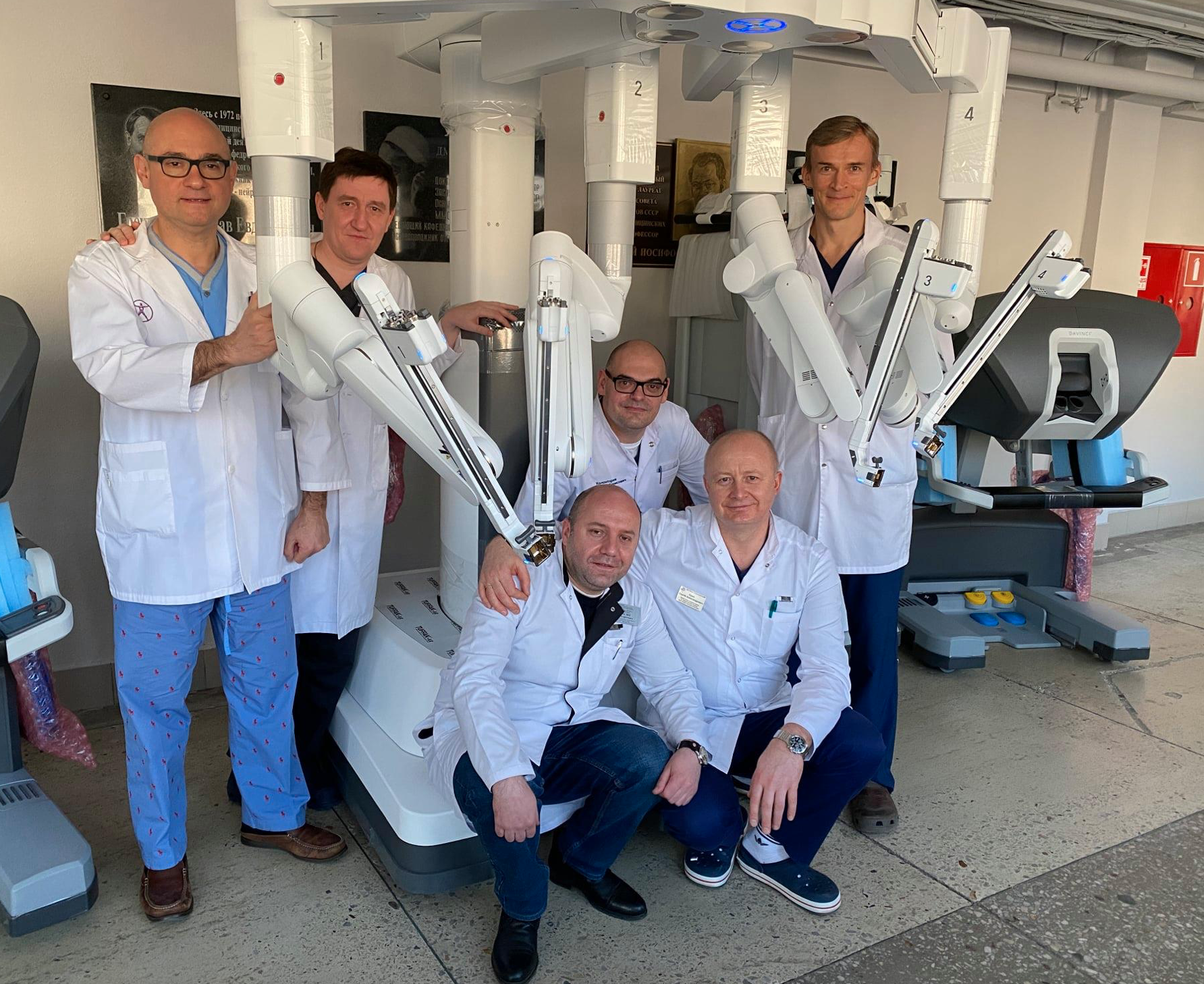
First DaVinciXi in Russia and Moscow. The fourth generation of the robotic system at the Urology Clinic City Clinical Hospital № 50. The first prostatectomy with DaVinciXi in Russia.
The closest results of a pandemic
Transformation of professional events
Russian urologists, not numerous and very amicable, are used to traditional professional meetings and personal contact. The changed circumstances have turned a format of meetings around and forced to study in remote interaction with audience and each other. Even the Congress of the Russian society of urologists — an invariable place of personal meetings, communication, an Russian urologists experience exchange— has passed in online a format.
The experience of remote events for almost the entire urological audience made it possible to highlight the format positive and negative aspects.
It is possible to characterize many events available to visit, listen to reports and act there as the speaker as an advantage. It is impossible to visit a similar number of events in offline mode even if we do not take financial expenses in attention.
The most part of the online-events is accredited in system of continuous medical education — so, it is possible to get points for participation.
Also, during them participants are more active: urologists willingly ask questions and comment on reports, so there is the feedback that allows not only to receive experts opinion, but to define the most sensitive issues and demanded speakers as well.
Online-meetings allow to conduct surveys or tests defining level of participants knowledge, their opinion and tactics in concrete situations.
The obvious disadvantages include lack of personal friendly communication, the complicated situation for speakers – lack of a «live» audience and its real time reaction to the speech, impact on health (physical inactivity, increased fatigue, sitting in front of the monitor, inability to distract and rest for a few minutes). At the same time the audience has increased requirements: the wait for an interesting topic presentation, speakers charisma, actual professional facts.
It should be noted that requirements of audience to a scientific component of the event and to speakers will increase.
Organizers face a time insuperable technical difficulty: lack of the Internet, sufficient for communication implementation between participants.
Despite all these features, many professional communities have managed to adapt to an online format.
The «ASPEKT» discussion club, assumed a burden on training urologists in 2020, may be considered as a striking example. They organized 48 meetings (more than 6 hours for each one) in 45 Russian cities and 5 independent schools on urolithiasis with participation of 25 speakers. Finally, there were 5168 + 1100 participants. It should be noted that there are not simply online-reports, but it is a debatable club, and everyone may ask a question, enter polemics with speakers, consider their own point of view. Organizers have prepared a new polls format among urologists with a conclusion of results in real time. It allows the speaker to see the urologists opinion in real time.
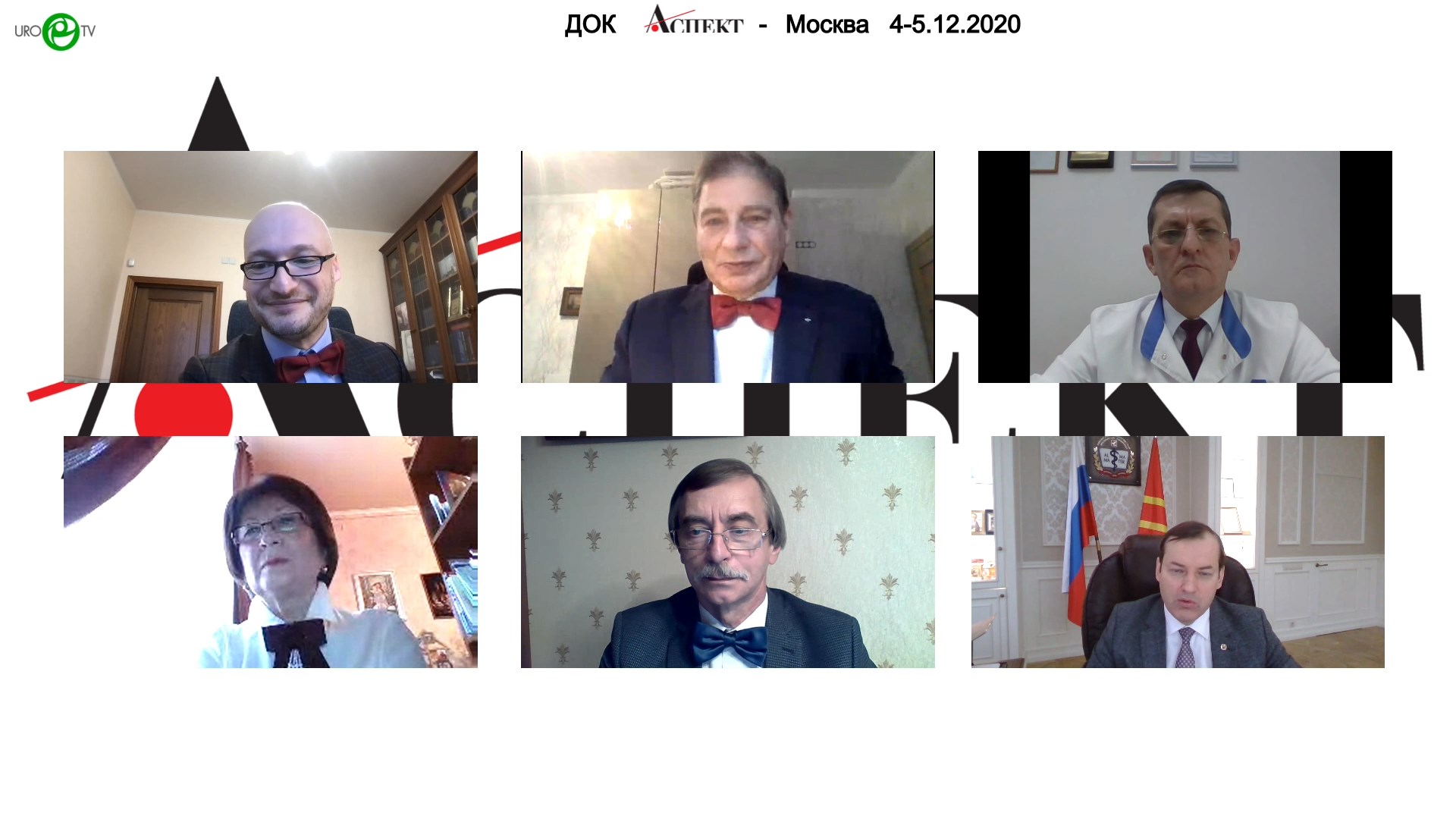
Online-meeting of the discussion club «ASPEKT». Moscow on December 4-5, 2020
According to the events calendar on Uroweb.ru, in 2020 there were held 260 events with organizational and information Uroweb team support.
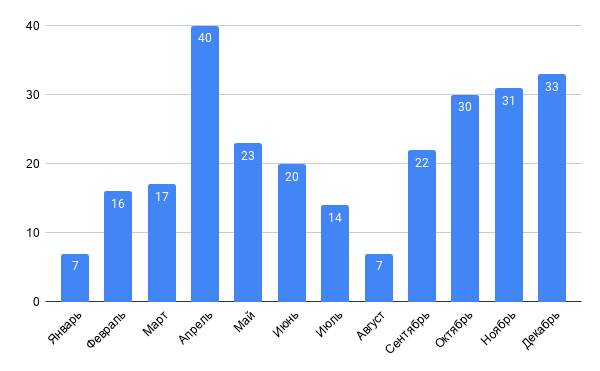
Number of events according to Uroweb.ru calendar for 2020
As you can see, the surge in activity traditionally occurred in April and November-December.
Over the past 6 years, the number of events has been at the approximately same level, and in 2020 we saw a sharp increase in the number of events that confirms our proposals that if the online-format continues in 2021, the number will increase or remain at the level of 2020, but will definitely be higher than in previous years.
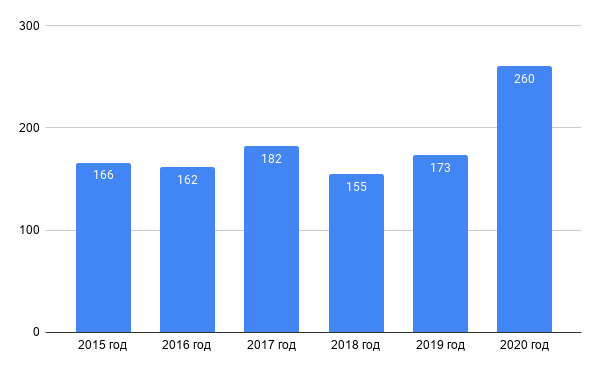
Number of urological events of 2015-2020
Development of telemedicine
Telemedicine (TM) received an unexpected impetus in development. During the pandemic, life put everything back in place and gave the answer to the question whether telemedicine would be or not. In all countries doctors of all specialties were forced to help their patients. The state system of our country has devoted all its strength to helping patients with COVID -19 by passing the attention of all other patients. Of course, it is wrong to reproach it – the burden on state and municipal institutions overnight became prohibitive, so it was impossible to help everyone at that time. This gap was filled by private medicine which received patients with non-communicable diseases, including urological diseases.
Nevertheless, there are outstanding issues and legislative features that significantly limit the possibilities of telemedicine. The following are the constraints, arranged by importance:
- Now remote medical care may be provided from the place with a license to provide it by profile. So, a urologist may provide remote consultations only at the workplace, it is impossible to provide it remotely at the place of his or her actual stay. Is that reasonable? We don't think so. The main tool of the urologist during remote assistance to the patient is the knowledge wherever he or she is; a laptop (smartphone); Internet/cellular communication. Does he or she need a licensed office with a cystoscope and other manual tools at the moment? Of course, not.
- Identification of participants in a telemedicine consultation – now there is a requirement according to which it is possible to be identified through the website of the State Services. Many private clinics are not ready for this, and it is currently impossible to get remote medical care anonymously.
- The issue of the possibility of making an initial diagnosis remotely without a face-to-face visit to a doctor is completed and discussible. Everything around you change, including medicine. New monitoring devices to be used at home appear, and patients may independently take the necessary tests in laboratories, undergo examinations using various imaging methods, remotely transfer the results of all tests to any doctor. Patients are least concerned about the safety and security of their data at this point, they want only one thing: to get medical advice with specific recommendations. Let's be honest, colleagues: many of us have provided this type of consultation, diagnosed and prescribed treatment. Perhaps, in the professional community there is a need to identify those situations and conditions in which both remote diagnosis and remote prescription of treatment are possible.
Loss of friends and colleagues
In no other year have we lost so many of our fellow urologists. It's bitter to write about it, the urological community is not enough, almost we all know each other personally. We met and communicated, discussed patients, were friends. And if it hadn't been for the COVID-19, they would have continued to live and work.
Anatoly Misakovich Hakobyan (St. Petersburg)
Rustam Anverovich Anverov (Novopavlovsk)
Oleg Yurievich Batishchev (Ufa)
Bondarenko Andrey Gennadyevich (Azov)
Borzhievsky Caesar Kaetanovich (Lviv, Ukraine)
Sergey Evgenyevich Zavatsky (Yekaterinburg)
Ivanov Alexander Pavlovich (Yaroslavl)
Kazikhinurov Alfrit Altafovich (Ufa)
Kapsargin Fedor Petrovich (Krasnoyarsk)
Oleg Mikhailovich Krestinin (Kursk)
Konstantin Anatolyevich Levchenko (Kislovodsk)
Mambetov Zhanybek Sultanbayevich (Bishkek, Kyrgyzstan)
Rotaru Corneliu (Chisinau, Moldova)
Solsayev Soip Nakaevich (Grozny)
Maxim Starinsky (Moscow)
Nikolai Ivanovich Tarasov (Chelyabinsk)
Andrey Evgenyevich Travkin (Podolsk)
Anatoly Ilyich Tibilov (Vladikavkaz)
Hamzin Adilzhan Akzhigitovich (Almaty, Kazakhstan)
Sholokh Pavel Ivanovich (Nur-Sultan, Kazakhstan)
Egamberdiyev Adhamjon Anvarberdievich (Rostov-on-Don)
Each of the deceased colleagues helped patients and contributed to the development of urology. The departure of each of our colleagues is a blow to our specialty, to regions and our patients. Probably, it will be correct if we remember not simply our friends but also to work more.
Life goes on
Work of the NMRC of Urology
At the end of 2019, 2 national medical research centers (NMRC) in the field of urology in Russia were established: Federal State Autonomous Educational Institution of Higher Education n.a. I.M. Sechenov – First Moscow State Medical University of the Ministry of Health of the Russian Federation (Sechenov University) (Director, Doctor of Medical Sciences, Professor Gazimiev M.A.) and the FSBI NMRC of the Ministry of Health of the Russian Federation (Director, Doctor of Medical Sciences, Professor, RAS corresponding member Apolikhin O.I.).
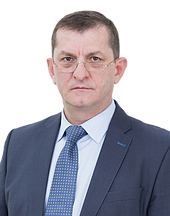
Gazimiev Magomed Alkhazurovich – Doctor of Medical Sciences, Professor, Director of the National Medical Research Center of Urology of Federal State Autonomous Educational Institution of Higher Education n.a. I.M. Sechenov – First Moscow State Medical University of the Ministry of Health of the Russian Federation (Sechenov University), Executive Director of the Russian Society of Urologists.
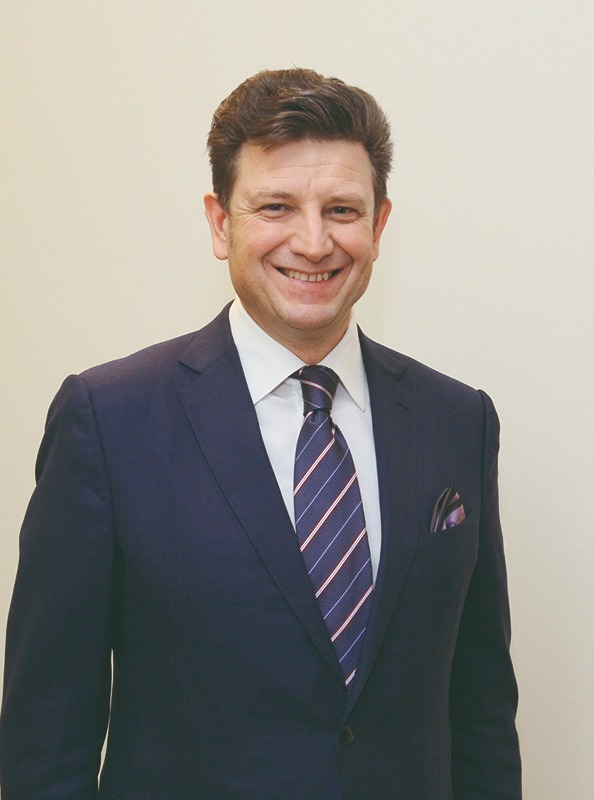
Apolikhin Oleg Ivanovich – Doctor of Medical Sciences, Professor, Corresponding Member of the Russian Academy of Sciences, Director of the National Scientific Research Institute of Urology and Interventional Radiology n.a. N.A. Lopatkin – National Medical Research Radiological Centre of the Ministry of Health of the Russian Federation.
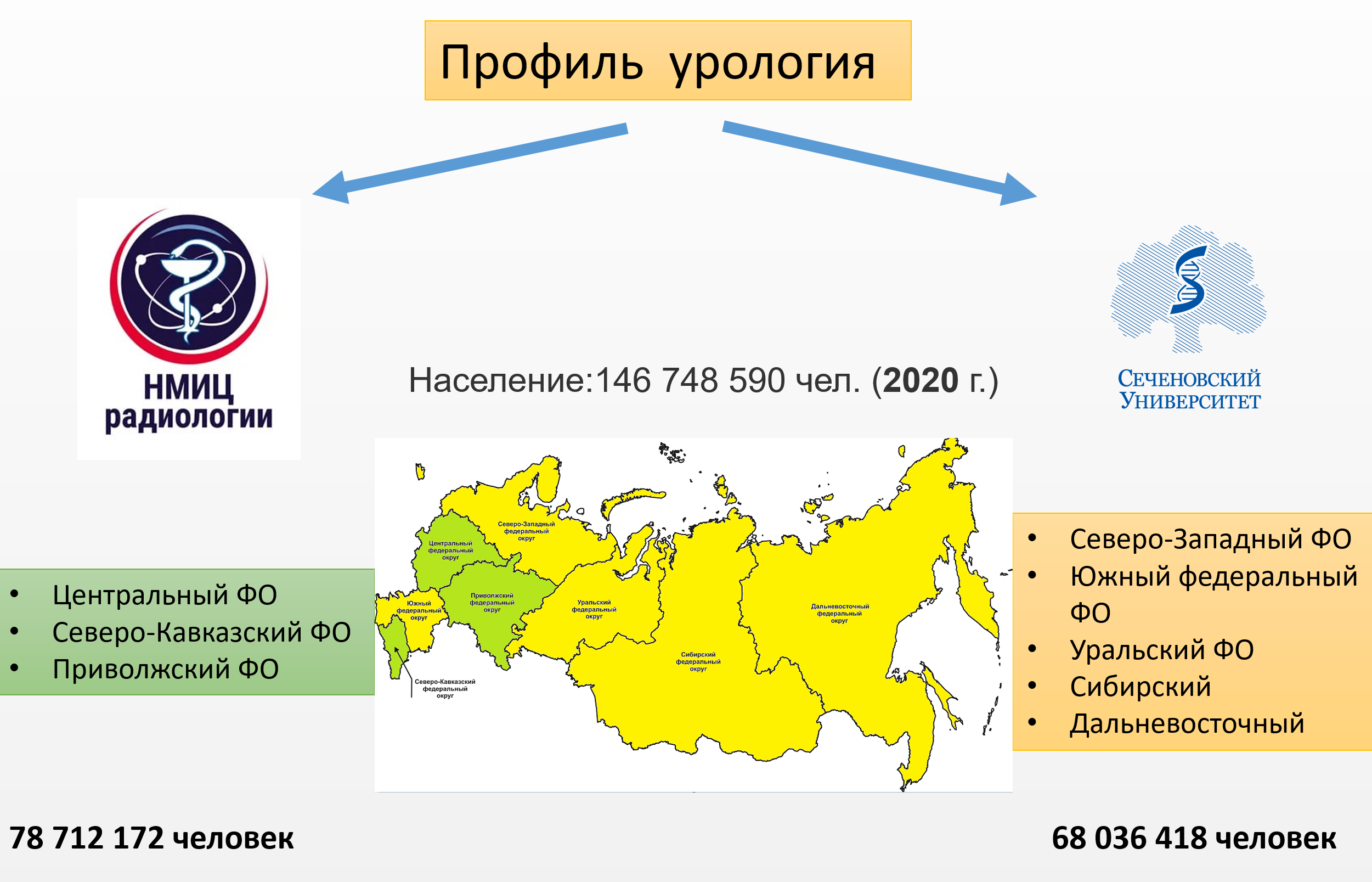
Taken from open sources. O.I. Apolikhin's performance at the 1140-th meeting of the Moscow society of urologists «NMRC of Urology: New Opportunities and Prospects for the Urological Service Development»
The NMRC of Urology of Sechenov University is responsible for the North-West, Southern, Ural, Siberian and Far Eastern Federal Districts with a population of 68,036,418 people, and then NMRC of Urology n.a. N.A. Lopatkin – for the Central, North Caucasus and Volga Federal Districts with a population of 78,712,172 people (the total population of the Russian Federation for 2020 is 146,748,590 people). The tasks of the NMRC were the introduction of the latest methods of diagnosis and treatment of urological diseases, consulting assistance, training of medical personnel and activities in the «attached» constituent entities of the Russian Federation.
In 2020, despite the pandemic, NMRC began its work, covering 1,200 institutions of all forms of subordination and property and 7,800 urologists. During the year, the NMRC held 397 consultations in video communication format and correspondence according to the applications – emergency (2 hours), postponed (24 hours), planned (3 days).
- In 51% of the regions there is no regional order on the organization of medical care in the profile of «urology»:
- There is no routing order
- Standard terms of rendering a medical care aren't designated
- The service structure isn't created
- There is no scheduled maintenance
- Criteria of efficiency aren't designated
- In 87% of regions there is no section on urology in «The program of development of health care of the region».
- In 92% of regions there is lack of provision on the chief non-staff urologist of the region and resolutions on its annual recommendations.
- In 90% of regions there is no assigned full-time employee of the regional health authority on urology.
Pilot programs «Men's Health and Social Longevity», «Distance Monitoring of Urological Diseases» are already being implemented, which are an example of the principle of continuous interaction between general practitioners and specialist doctors for the early urological diseases detection.
All the above problems need to be solved both at the professional (methodological) and legislative regional and federal levels.
Accreditation. Start
Now an order on the mandatory entry of medical and pharmaceutical specialists into the continuing medical education (CME) system is under consideration. However, in the spring of 2021, the document will be approved and as expected legalized. But, given the specifics of the work of medical workers during a pandemic, the Ministry of Health of the Russian Federation plans to introduce a moratorium until June 1, 2021 on the admission of individuals to medical and pharmaceutical activities without a specialist certificate or accreditation certificate.
If you have a valid certificate, you do not need to pass accreditation and obtain a certificate. Until the document expires, doctors may continue to work without passing the accreditation exam. If there is no document, the specialist needs to pass all stages of the exam in specialized centers. Without accreditation in 2021 they will not allow you to work, but they cannot fire without justification according to the law – time is given to study and pass the accreditation exam.
It is necessary to score 50 CME points per year, respectively, 250 points for 5 years. Almost all professional urological communities have prepared for this situation: the Russian Society of Urologists, the Russian Society of Oncourologists, Aspect, Rational Pharmacotherapy in Urology, the Society of Neurourologists, the Society of Men's Health, the Internet Forum of Urologists, Stonefighters, regional urological societies and associations. Professional urological resource Uroweb.ru is also ready to hold events and training courses with CME points, including in a remote format, and in this regard actively cooperates with all event organizers.
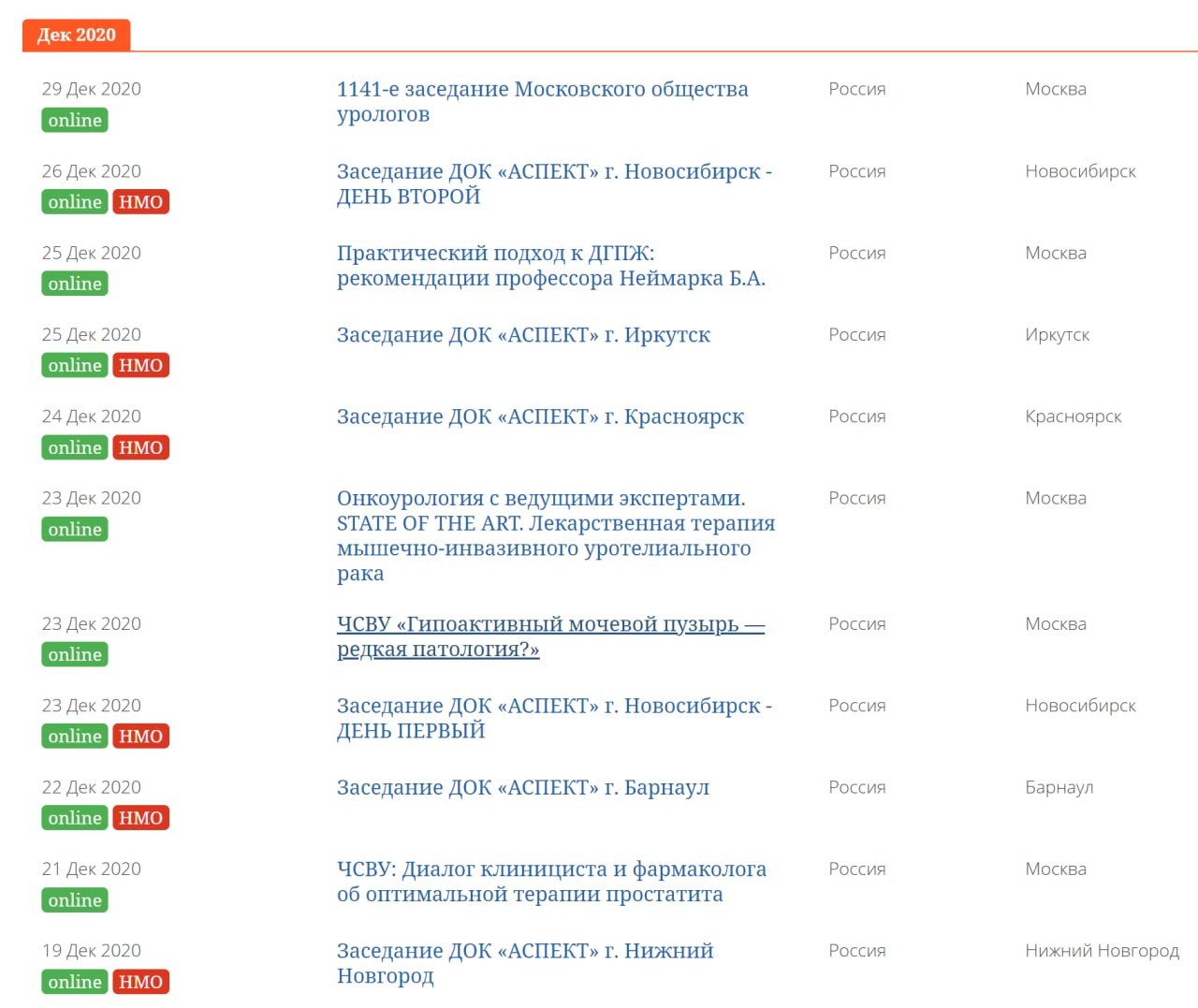
Uroweb.ru actively cooperates with all organizers of events and training courses with delivery of points of CME
New source of research
Not only the healthcare system and practical medicine, but also the scientific community have reacted to the COVID-19 pandemic. The work of the urological service in conditions of epidemiological distress has become the subject of scientific research and, as a result, scientific publications.
Provision of inpatient care to urological patients in the context of the coronavirus infection pandemic COVID-19. Malkhasyan V.A., Kasyan G.R., Khodyreva L.A., Kolontarev K.B., Govorov A.V., Vasilyev A.O., Pushkar D.Yu.
DOI: 10.29188/2222-8543-2020-12-1-4-11
COVID-19: impact on the urological service of the Russian Federation. Pushkar D.Yu., Kasyan G.R., Malkhasyan V.A., Sazonova N.A., Shaderkin I.A., Shaderkina V.A.
DOI: 10.29188/2222-8543-2020-12-2-13-17
Genitourinary system and COVID-19: some aspects. Sivkov A.V., Koryakin A.V., Sinyagin A.A., Apolikhin O.I., Kaprin A.D.
DOI: 10.29188/2222-8543-2020-12-2-18-23
Prospects for the treatment of patients with urogynecological profile in the context of the COVID-19 pandemic and the subsequent removal of restrictive measures. Gvozdev M.Yu., Shaderkina V.A., Shaderkin I.A., Dzhuraeva M.D., Arefieva O.A.
DOI: 10.29188/2222-8543-2020-12-2-24-32
Metamorphosis of oncourology after the first wave of the COVID-1 pandemic. Belyaev A.M., Nosov A.K., Ignatova O.K., Bayramov Kh.N., Ryabinin R.I., Shchekuteev N.A., Saad A.E., Berkut M.V.
DOI: 10.29188/2222-8543-2020-12-3-16-24
Many scientific works on studying of a COVID-19 influence on male fertility, function of a prostate, a bladder and kidneys are expected. Possibly, during pandemic existence urologists will manage to save up, systematize and analyze a scientific material on this category of patients.
There were executed 20 years to one of the most known journals «Andrology and Genital Surgery» (the editor-in-chief is the president of PAAA, Professor Shcheplev Pyotr Andreevich) which was dedicated to the anniversary scientific conference, attended by famous Russian andrologists discussing not only the vectors and prospects of the journal, but also – issues of clinical andrology that remain topical regardless of the epidemiological situation in the country.
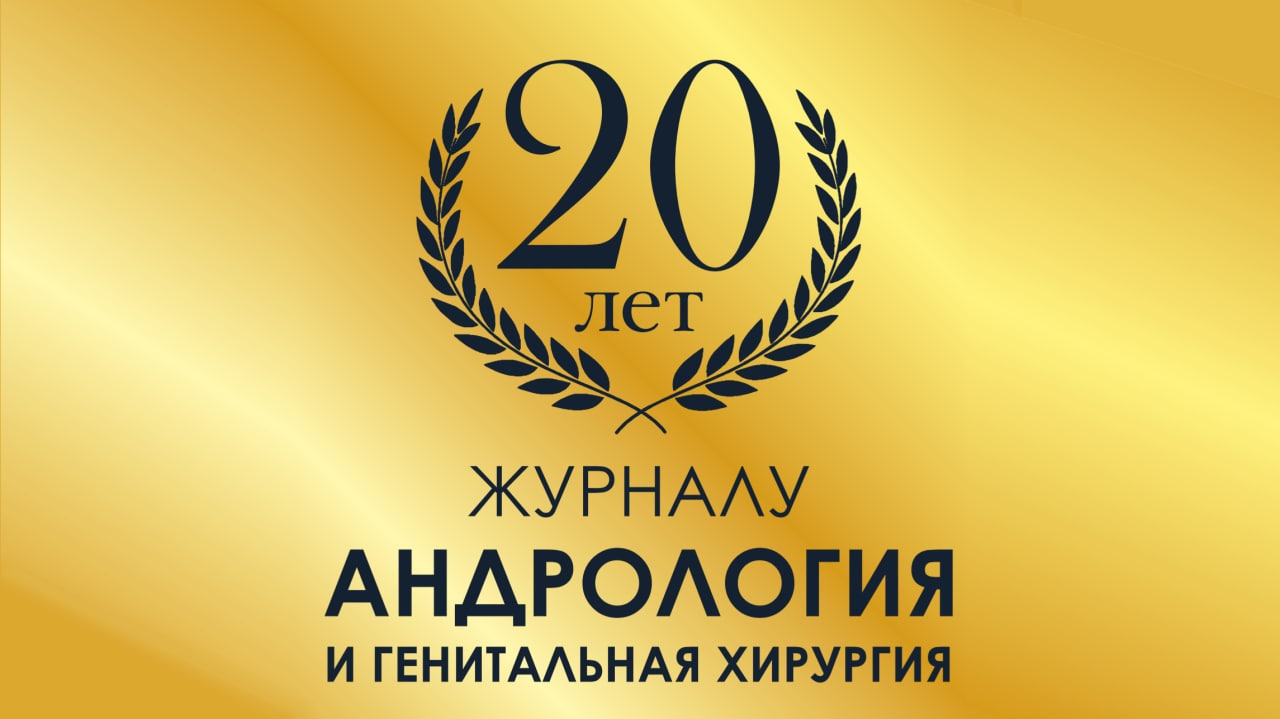
Anniversary issue of the «Andrology and Genital Surgery» magazine
New media projects for urologists
In the second half of 2020 the author's project «Oncourology with leading experts. State of the art» of Professor Pavel Ilyich Rasner started. It is a professional information and education program in which leading experts of oncourology share their experience, their opinion on various issues of domestic and international clinical practice and new directions in the specialty. Professor B.Ya. Alexeyev, M.I. Volkova, K.A. Nyushko, N.V. Vorobyov, K.E. Borisov, B.E. Osmolovsky participate.
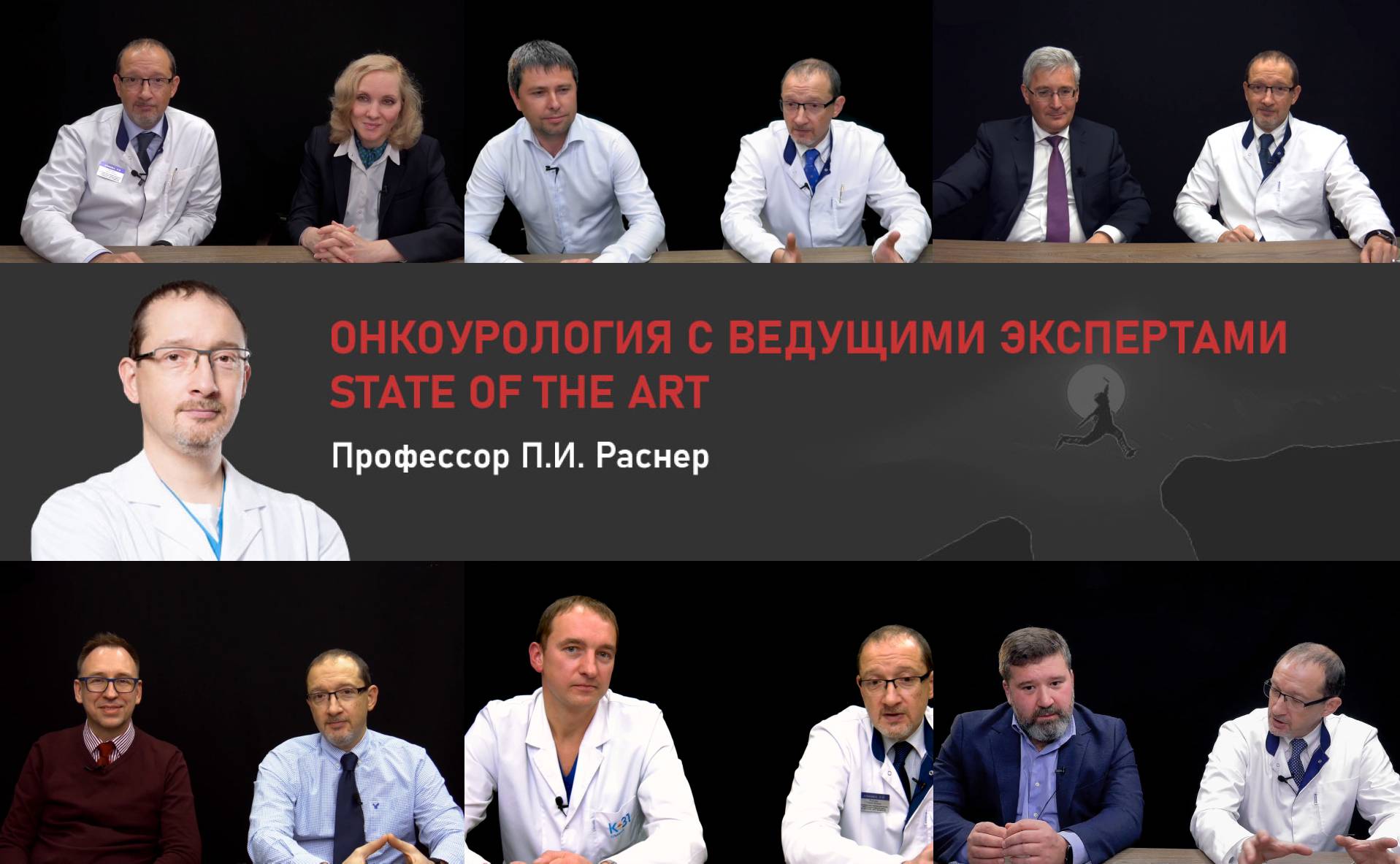
The project “Oncourology with leading experts. State of the art” under the leadership of Professor Pavel Ilyich Rasner
The number of participants in the broadcast total exceeded 1300 people and video views in recording – more than 3,200 in 2 months.
«Endourology is not for “dummies”» – the author's project of Doctor of Medical Sciences, Professor Nikolai Alexandrovich Grigoriev – a recognized guru of endourology, head of the urological clinic of JSC «European Medical Center». Videos on difficult catheterization, contact ureterolithotripsy of proximal stones, coagulation life hacks in the urinary tract, prostatitis stents, renal colic in pregnant women have gathered a wide audience and 3315 views.
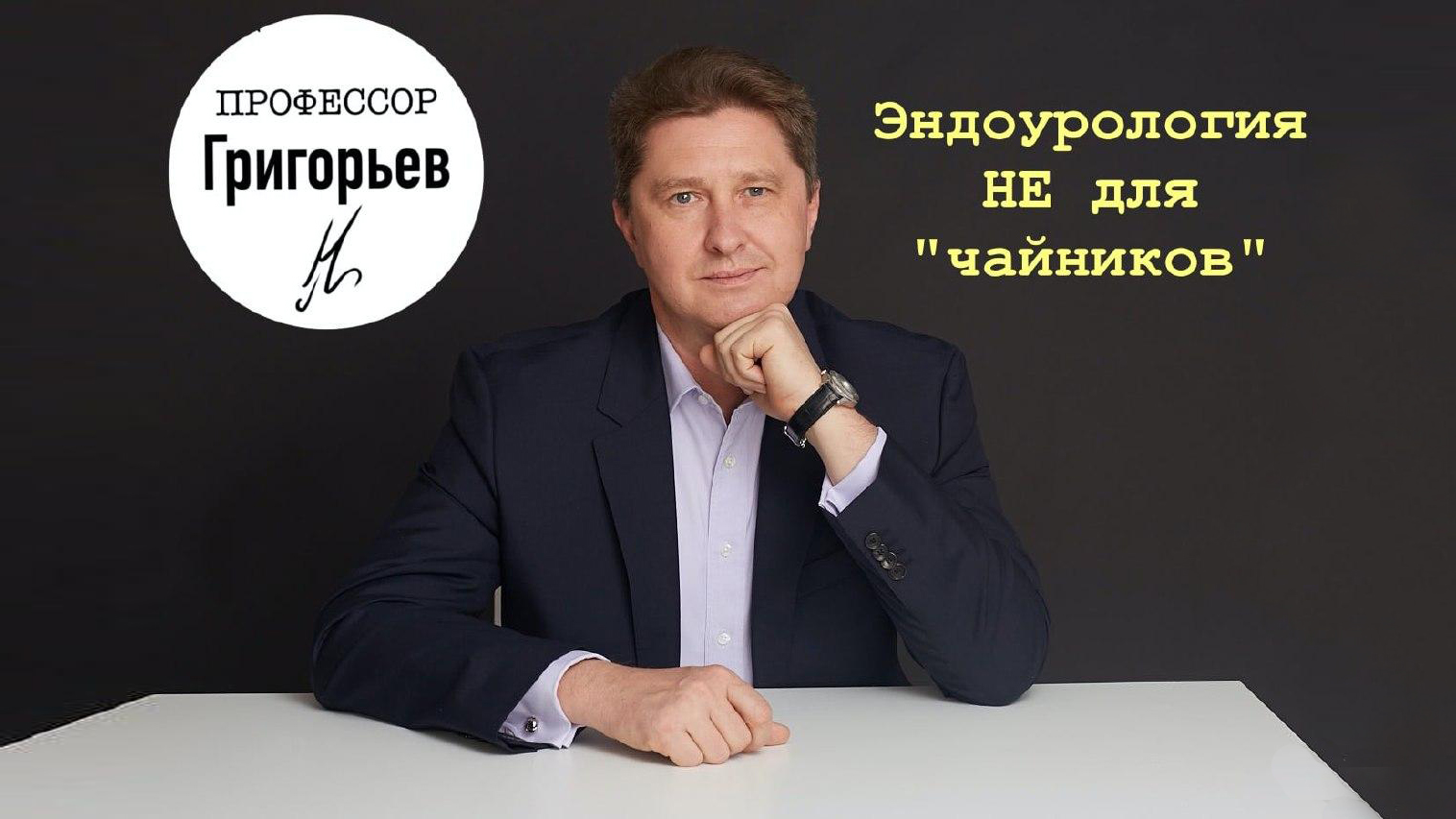
Author's educational project of Professor N.A. Grigoriev «Endourology is NOT for “dummies”»
Three times Academician of the Russian Academy of Sciences Dmitry Yurievich Pushkar with the participation of Professors Kasyan G.R., Govorov A.V., Kotov S.V., Krivoborodov G.G. held the «Ordinator's with the Chief Urologist of the Russian Federation» on Uro.TV, which considered the urological service in the conditions of the COVID pandemic, the quality of medical care to patients with benign prostatic hyperplasia, lower urinary tract symptoms, metabolic syndrome, as well as the life quality of patients after prostate surgery.
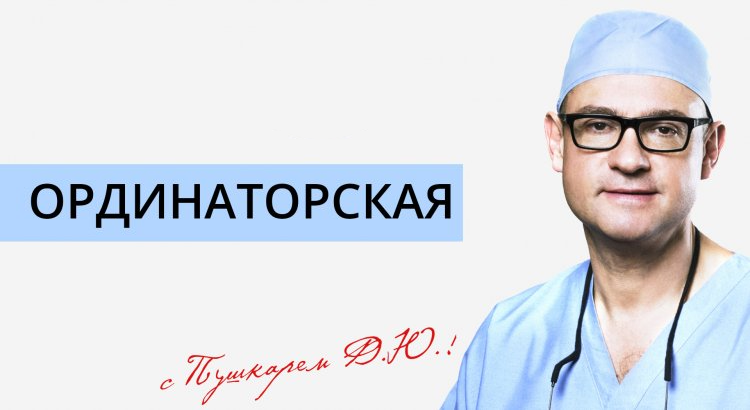
Professional information and educational program «Ordinator's with the Chief Urologist of the Russian Federation»
New books on urology
«Emergency surgical care in the conditions of COVID-19». Authors: Corresponding Member of the Russian Academy of Sciences, Professor Alexey Vasilyevich Shabunin; Academician of the Russian Academy of Sciences, Professor Dmitry Yurievich Pushkar; Doctor of Medical Sciences, Professor Kasyan Gevorg Rudikovich; PhD in Medical Sciences Vasilyev Alexander Olegovich.
«Temporary methodological recommendations for providing specialized medical care to adults in the field of «urology» in the context of the new coronavirus infection COVID-19». Authors: Pushkar D.Yu., Pogonin A.V., Kuandykova M.V., Kasyan G.R., Govorov A.V., Kolontarev K.B., Khodyreva L.A., Malkhasyan V.A., Kupriyanov Yu.A., Vasilyev A.O.
«Principles and steps for recovery of urological care after COVID-19». Authors Pushkar D.Yu., Pogonin A.V., Kuandykova M.V., Kasyan G.R., Govorov A.V., M.Yu. Gvozdev, Akhvlediani N.D., Khodyreva L.A., Bernikov A.N., Reva I.A.
«Sacred neuromodulation in the treatment of urinary disorders». Authors: E.S. Korshunova, M.N. Korshunov, A.S. Nikitin, R.M. Nanaev, I.S. Trifonov, S.P. Darenkov, V. B. Krylov.
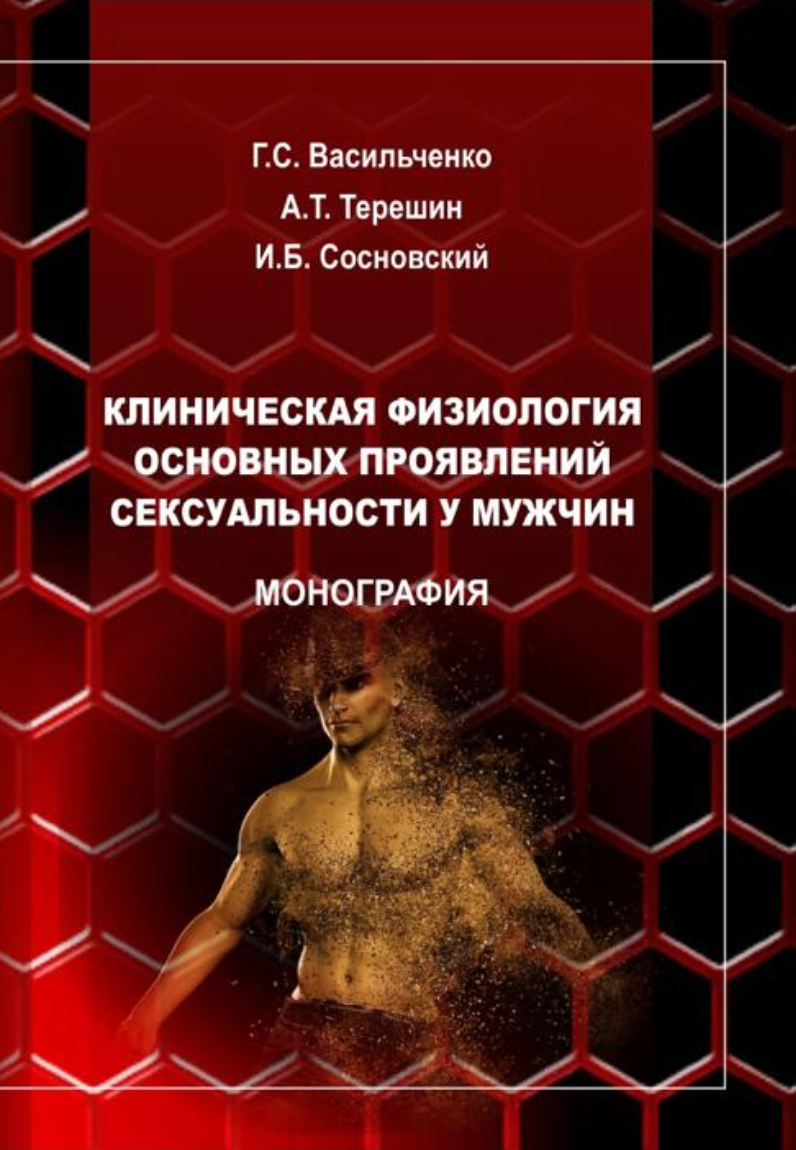
Manifestations of men's sexuality were considered from the clinical physiology point of view by the team of authors including Vasilchenko G.S., Tereshin A.T., Sosnovsky I.B. The book provides a fundamental analysis of research by biologists, geneticists, embryologists, and the authors show various models of the reproduction process in nature, the role of gender differentiation in the evolutionary transformation of the genetic fund, gender differentiation in early ontogenesis and multidimensional field definition. From modern positions, the authors cite data on the anatomical and physiological support of the male sexual sphere, functional activity of additional sex glands, peculiarities of genital vascularization.
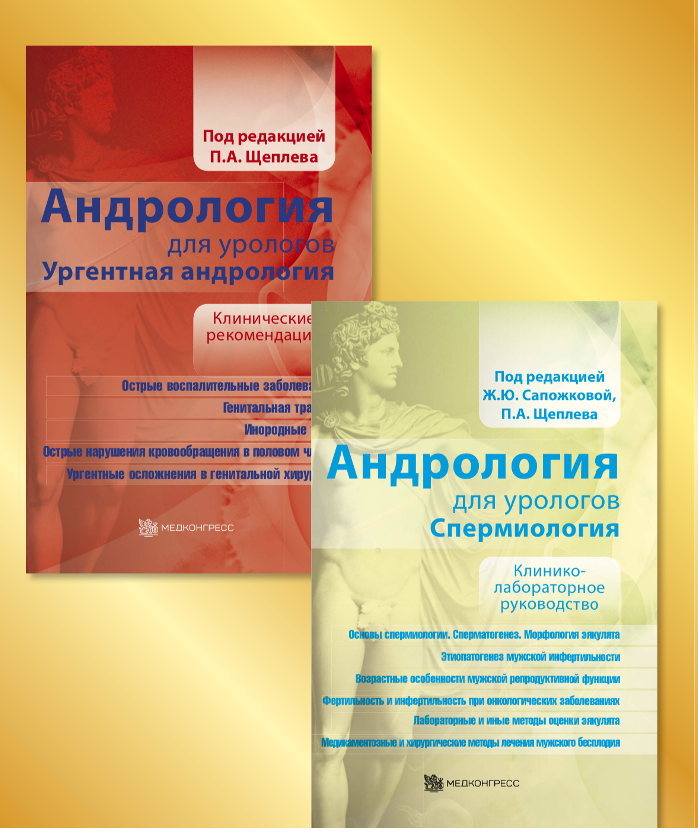
At once 2 books from the series “Andrology for Urologists” were published under the editorship of Professor P.A. Shcheplev – «Urgent Andrology» and «Spermiology» (with the participation of J.Yu. Sapozhkova).
Social impact-factor
The changed reality requires change in all spheres of life: personal, professional and social.
If you are engaged in science, you follow the impact factor of the scientific journals in which you plan to publish. Modern life requires all continuous social “visibility” to increase the so-called social impact-factor.

This applies to doctors who want to attract patients. It is considered a “good tone” to have an Instagram channel in which you may demonstrate the results of successful operations, positive feedback and interviews with cured and satisfied patients, dosed to show a part of your personal life to look more humane. This format is especially liked by young and ambitious doctors who can't imagine their lives without the Internet. But recently, older doctors have not lag behind them, seeing increased interest from patients in a short time of such activity.
Social visibility is also necessary for people of science. If you are engaged in scientific work, you must act as a speaker at professional events, presenting the results of scientific research and sharing your own experience. However, with the transition of events to online format, not all speakers were ready to perform online. This is due to the difficulties of mastering various broadcasting platforms, the availability of equipment and communication sufficient to work online. Especially reluctantly, “speakers of one report” are especially reluctant to switch to online-mode. All speeches are published and available for viewing in recording, so if the speaker has only one report or several reports on the same topic, with the integration of drugs from different pharmaceutical companies, all this is brought to the surface on the Internet and becomes obvious.
Social impact-factor = social visibility
Despite the difficulties and unusualness of working in the online mode, a lot of speakers managed to reformat their work and in almost a year to adapt to new conditions. They switched to a remote format of performances, opened various additional channels of communication with the audience such as social networks, Telegram, WhatsApp, Zoom, Instagram, YouTube channels, integrated with already known platforms. Such speakers understand and trace the chain of events: you won't manage to adapt — you won't act — you won't be visible (low social-impact a factor) — there will be no interest from professional community — there will be no interest from pharmaceutical companies. Only a small number of well-known scientists, quite noticeable and in demand in the «pre-COVID-19» time, disappeared from social visibility, apparently waiting for a return to their usual way of life and work.
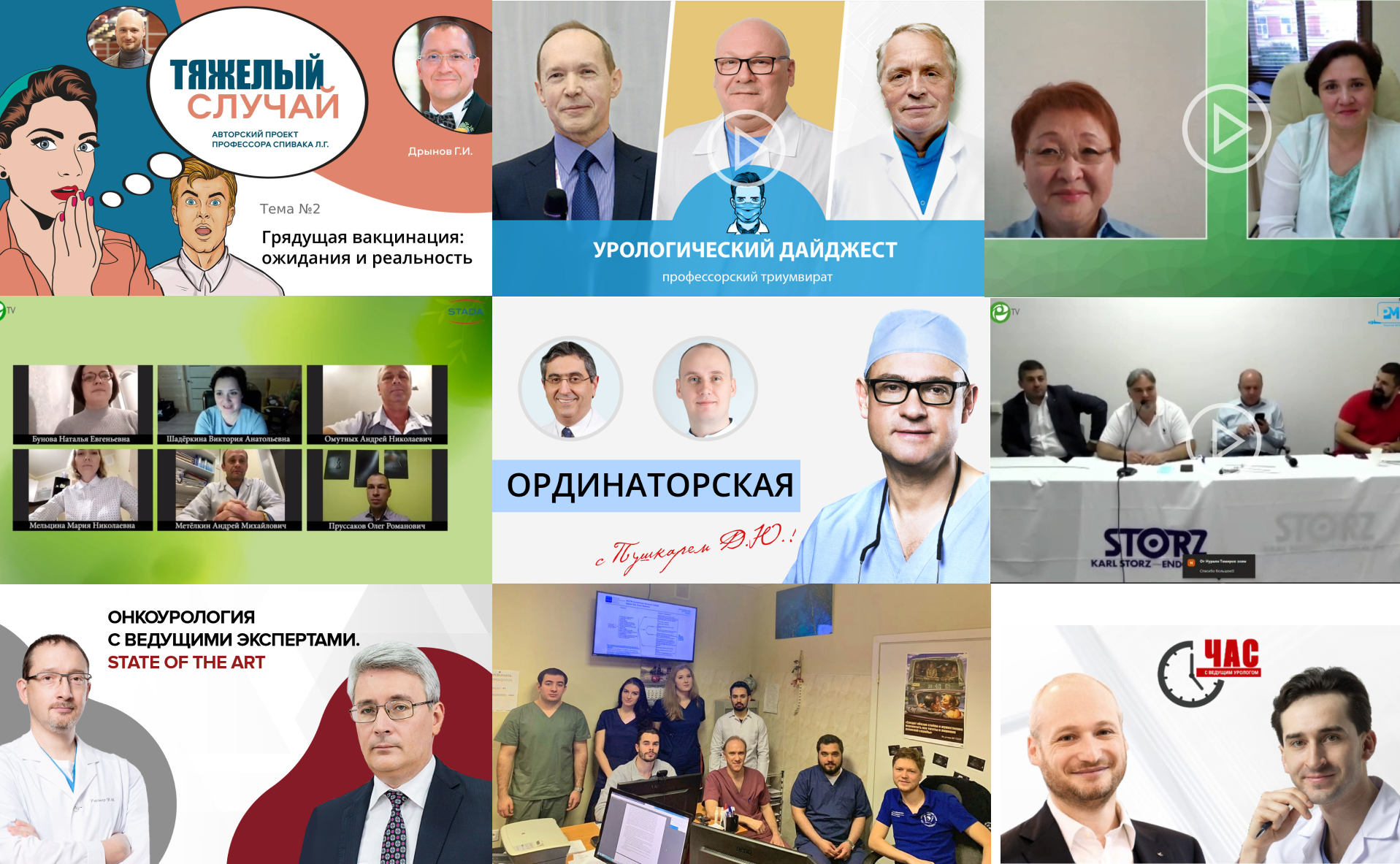
2020 was full of new formats, projects and new speakers
Finally, we all hope for the return to “normal life”, to face-to-face events, to personal communication. But in our opinion, we should not expect it quickly. And it is unlikely that we will go back to our former lives without restrictions for sure. Therefore, it is necessary to continue to learn remote technologies, it is necessary to live here and now, adapt to the existing conditions and continue to implement our professional tasks with all possible opportunities.



